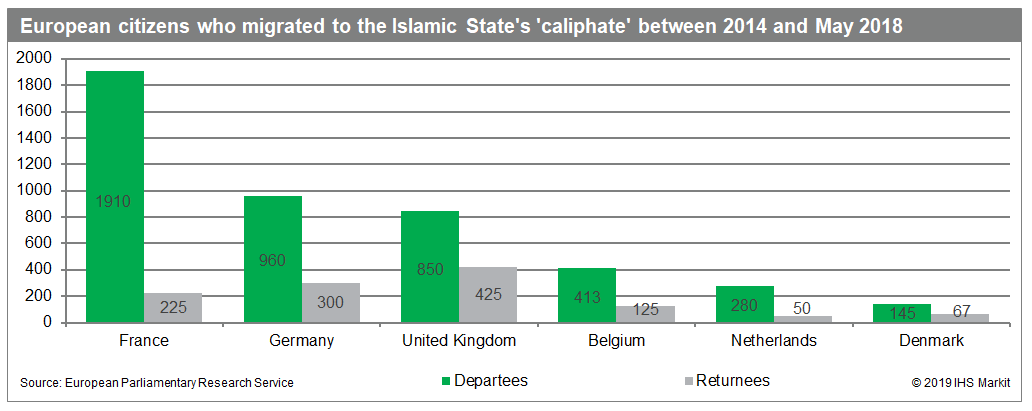Customer Logins
Obtain the data you need to make the most informed decisions by accessing our extensive portfolio of information, analytics, and expertise. Sign in to the product or service center of your choice.
Customer Logins
BLOG
Mar 13, 2019
Islamic State foreign fighter repatriation
Between 800 and 1,000 Islamic State fighters, many of whom retain Western citizenship, are being held by the Kurdish-led Syrian Democratic Forces (SDF) at detention centers in northeastern Syria. With the US planning to withdraw most of its troops from Syria imminently, the fate of these Islamic State prisoners poses a serious challenge for European governments.
European governments will probably attempt other options where possible, but up to a few hundred European citizens who joined the Islamic State are ultimately likely to be repatriated on a case-by-case basis. In specific cases, alternative routes to repatriation will be applicable.
One option is to revoke citizenship for individuals with dual nationality, or who are eligible for citizenship from another country. Another option is prosecuting individual fighters in Iraq or Syria, where they allegedly committed crimes.
Iraq intends to prosecute 13 French citizens and has also shown interest in trying certain German nationals, all of whom who would be likely to face the death penalty.
Furthermore, Syria's Kurds have proposed that the United Nations establish a special international court in northern Syria to try individuals. A UN tribunal would probably require the establishment of more permanent detention facilities, administered by the UN, and judicial process conducted there would probably take up to several years, pending the collation of sufficient evidence to justify prosecution. IHS Markit assesses that most of these options would face significant practical and legal hurdles, leaving the eventual repatriation of up to a few hundred fighters as the most likely scenario for countries such as Belgium, France, and Germany.
Due to the high evidentiary standard of European legal systems, convictions leading to extensive prison sentences for these individuals are likely to be highly problematic. In most cases, "battlefield evidence" is not admissible in court, while sanitizing classified intelligence into evidence that can be used by prosecutors is problematic. As such, in many cases these individuals will likely, if convicted, be handed relatively short prison sentences.
While incarcerated, they will likely increase radicalization risks in prisons, and following their release pose the threat of using their military experience and personal jihadist connections to strengthen the capabilities of jihadist networks in Europe. Despite post-release restrictions limiting their movement, security services lack the resources to subject them to constant surveillance owing to the concurrent need to monitor thousands of other home-grown radicalized individuals.

If released in Syria, many Islamic State fighters would seek to return to Europe undetected, increasing the planning and operational expertise of European cells in Belgium, France, Germany, and the Netherlands. In the event of an 'unmanaged release' of Islamic State members from detention in Syria, several militants would probably attempt to return to Europe undetected, many with the intention of engaging in acts of domestic terrorism.
Recent cases show that entering Europe's southern borders while avoiding detection is challenging, but not impossible. Once inside the Schengen passport-free area, crossing borders in continental Europe would be easy, with Belgium, France, Germany, and the Netherlands likely being preferred targets. Entering the UK border undetected, on the other hand, would probably prove far more difficult, mitigating the likely impact on the United Kingdom from returnees seeking to go unnoticed.
Islamic State fighters returning with the express purpose of carrying out attacks would likely seek to embed themselves in existing Islamist militant networks across Europe. These militants, with extensive combat experience, would increase the attack capability of European cells, injecting a high level of planning and operational expertise. They would also likely be capable of transferring knowledge on matters such as security awareness, or the construction of reliable improvised explosive devices (IEDs). Networks including foreign fighters would therefore likely be intent on staging sophisticated, multisite attacks such as those in Paris in November 2015 and Brussels in March 2016. Both of those attacks involved militants who had received training abroad.
Indicators of changing risk environment
Increasing risk
- A Turkish-led military offensive against the Kurds in northern Syria would probably lead to the uncontrolled release of Islamic State detainees, increasing risk of foreign fighters returning to Europe undetected.
- The SDF threatens to release Islamic State detainees within a certain timeframe, prompting several European governments to repatriate their citizens en masse.
- Many of the latter would likely fail to reach the evidentiary threshold for a successful prosecution
Decreasing risk
- Establishment of a UN special tribunal in northern Syria to try detained Islamic State members, as requested by the Syrian Kurds.
- An extension of the US military deployment in Syria, which would reduce the likelihood of an unmanaged release of Islamic State detainees.
{"items" : [
{"name":"share","enabled":true,"desc":"<strong>Share</strong>","mobdesc":"Share","options":[ {"name":"facebook","url":"https://www.facebook.com/sharer.php?u=http%3a%2f%2fstage.www.spglobal.com%2fmarketintelligence%2fen%2fmi%2fresearch-analysis%2fislamic-state-foreign-fighter-repatriation.html","enabled":true},{"name":"twitter","url":"https://twitter.com/intent/tweet?url=http%3a%2f%2fstage.www.spglobal.com%2fmarketintelligence%2fen%2fmi%2fresearch-analysis%2fislamic-state-foreign-fighter-repatriation.html&text=Islamic+State+foreign+fighter+repatriation+%7c+S%26P+Global+","enabled":true},{"name":"linkedin","url":"https://www.linkedin.com/sharing/share-offsite/?url=http%3a%2f%2fstage.www.spglobal.com%2fmarketintelligence%2fen%2fmi%2fresearch-analysis%2fislamic-state-foreign-fighter-repatriation.html","enabled":true},{"name":"email","url":"?subject=Islamic State foreign fighter repatriation | S&P Global &body=http%3a%2f%2fstage.www.spglobal.com%2fmarketintelligence%2fen%2fmi%2fresearch-analysis%2fislamic-state-foreign-fighter-repatriation.html","enabled":true},{"name":"whatsapp","url":"https://api.whatsapp.com/send?text=Islamic+State+foreign+fighter+repatriation+%7c+S%26P+Global+ http%3a%2f%2fstage.www.spglobal.com%2fmarketintelligence%2fen%2fmi%2fresearch-analysis%2fislamic-state-foreign-fighter-repatriation.html","enabled":true}]}, {"name":"rtt","enabled":true,"mobdesc":"Top"}
]}




